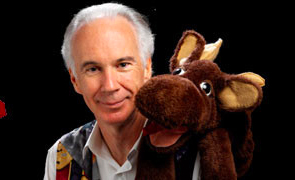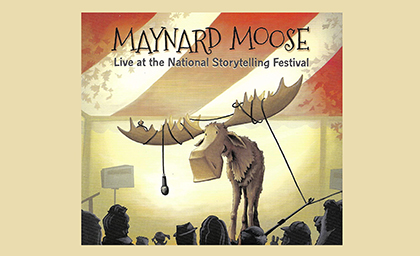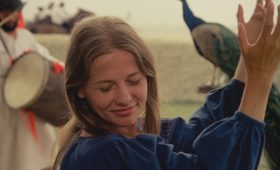Willy Claflin’s “Pegamoose and the Gorgonzola Medusa” is a mythological adaptation of the classical myth of Perseus and Medusa, a kind of doggerel pastiche passing familiar details but veering into a novel account of a heroic moose. Whether or not the result is comic brilliance is for the listener to judge.
“Pegamoose” was recited by Claflin and recorded live at the National Storytelling Festival in Jonesborough, TN in 2008. The recording features as the lead piece in an hour-long radio broadcast on KBYU-radio’s Appleseed program (aired 30 Apr 2021) now available in podcast. In the KBYU show, assistant producer Lacy Ivie engages in a brief discussion with radio-host Sam Payne, before “Pegamoose” plays. They discuss how classical myths abide well beyond the time-frame in which they originated. Though limited analysis attends the recording, “Pegamoose” aptly heads a suite of other mythological (some classical) narratives that fill the Appleseed hour.
A favorite headliner and em-cee at the annual Jonesborough Festival, Willy Claflin plies humor that is characterized as “unhinged” and filled with “musical surprises.” (East Brunswick, NJ, Public Library site) Claflin’s own website characterizes the storyteller “a one-man festival” because of his wide-ranging repertoire in narrative and folk-music. To judge by the live laughter heard abundantly in the “Pegamoose” tale, audiences enjoy buying into Claflin’s endearing style.

Claflin bases his narrative persona on the premise that his partner, Maynard the stuffed moose, actually tells the stories and that Claflin translates from Moose-speak into English. This fictitious arrangement plays throughout Claflin’s several books and all the performances shared on his album Maynard Moose: live at the National Storytelling Festival (2011), on which “Pegamoose” is on disc B, track 4. In “Pegamoose”, Claflin first invokes the “nine mooses of song” (get it?! “mooses”), sets off into the first Homeric glimmering of rosy-fingered dawn, and then bends the myth of Perseus from epic familiarity toward intended parodic hilarity. I was expecting from the title “Pegamoose” that Maynard might have assumed the attributes of mythology’s most famous winged quadruped within the tale; Perseus, however, not Pegasus, is clearly the dominant rolemodel for Pegamoose. The title also suggests that Medusa is a pungent character, and she is; but the homophonic joke proves not to have the legs to last the whole story..
To my ear, Claflin’s resultant adaptation of the Perseus saga resembles much more a father’s bedtime story — a benign narrator I might want to recall while chatting with my grandchildren and diving incessantly onto details for yucks — than an insightful adaptation of a powerful saga. I by no means intend by such critique to cheapen Claflin’s storytelling. Whereas the best mythological adaptations inject new meaning into their forebears, the narrative of Pegamoose will stand, I believe, as its own terminal expression, unlikely to be further adapted or closely emulated.
Further classical mythological narratives included by Ivie and Payne in the Appleseed broadcast will encourage readers of OGCMAonline.byu.edu to pursue the recording all the way to its end. These include, first, Fran Stallings reciting the myth of “King Midas”. Stallings’ account is very orthodox. By this I mean to recommend Stallings’ adherence to “the” Midas myth as explicated in classical sources such as Diodorus Siculus (Bibl. 3.59), Ovid (Met. 9.146-93 and 11.85-146), or Hyginus (Fab. 191, 274). Such classical myths are recognized from ancient sources and stated authoritatively in The Oxford Guide to Classical Mythology in the Arts (1993, Oxford University Press; ogcma.byu.edu/Midas1.0000_Reid) and elsewhere.
The second of the other classical myths shared in the Appleseed broadcast is Milbre Burch’s more remarkable telling of the uncommon myth of Rhodopis. Hardly the house-hold-name figure that a Midas or a Perseus have achieved among modern receptions, Rhodopis arrives via Burch’s telling as a Cinderella forebear, a mythological figure worth knowing. Burch therefore credentials Rhodopis as the mythological creation of Strabo and other storytellers from antiquity to Shirley Climo. Rhodopis’s story is well told, of course, by Burch in a recording contextualized in the Appleseed; but, further contextualization is to be had in her publication If the Shoe Fits: Cinderella stories from around the world.
Lacy Ivie and Sam Payne, in creating the variegated trifecta of classical-mythological adaptations for their radio program cut a fascinating cross-section through contemporary uses of Greek mythology. Each included artist — Claflin, Stallings, and Burch — retells a myth stated in ancient Greek sources; but each engages the modernization of the narrative in a different adaptive mode, ranging from receptive analysis (Burch) to authoritative awareness (Stallings) to willfull appropriation (Claflin). Each warrants further study.
PerseusMedusa2.0110_ClaflinMaynardMoose
WillyClaflin.com: http://www.willyclaflin.com/
Claflin’s publisher’s page: https://www.augusthouse.com/willy-claflin
Terminus ante quem 1 July 2012, as cited on Jared Hartman’s Lorem Ipsum website (kith.org),
who files it under “commonplace book, humor”. [accessed 16 June 2021]
Midas2.0010_Stallings
https://www.franstallings.com/web/Publications
Rhodopis2.0010_Burch
https://www.kindcrone.com/about-milbre
Burch, Milbre. 2005. If the Shoe Fits: Cinderella stories from around the world. Audiobook on CD.
“Classic Myths” on The Appleseed, KBYU-radio: aired 30 April 2021, accessed 16 June 2021 — https://www.byuradio.org/4c4061b1-8e3a-4cd1-ae1f-366e0d4df5dc
_____________
The KYBU-Appleseed site:
It’s time for the Apple Seed! Some time every day filled with stories for you and your family. Today we are bringing you a collection of mythology stories from all over the world, including Greece, Persia, Egypt, and more. All kinds of tales from all kinds of tellers. Coming up, we have a variety of myths told in all kinds of ways for you to enjoy. Today we’ll be hearing from storytellers like Willy Claflin, Fran Stallings, Milbre Burch, and The Storytellers. On today’s episode of The Apple Seed, enjoy the following stories: “Pegamoose and the Gorgonzola Medusa” by Willy Claflin from Maynard Moose Live at the Storytelling Festival (2:49) Radio Family Journal: “Motorcycle” by Sam Payne (17:09) The Daily Mix: “Falling in Love with Food” with Colton Soelberg (22:26) “The Naga” by The Storytellers from Gather Round the Fire (30:23) “Good? Bad? Midas” by Fran Stallings from Stories and Songs for a Green Earth (45:22) “Rhodopis” Milbre Burch from If the Shoe Fits: Cinderella Stories from Around the World (48:52)


